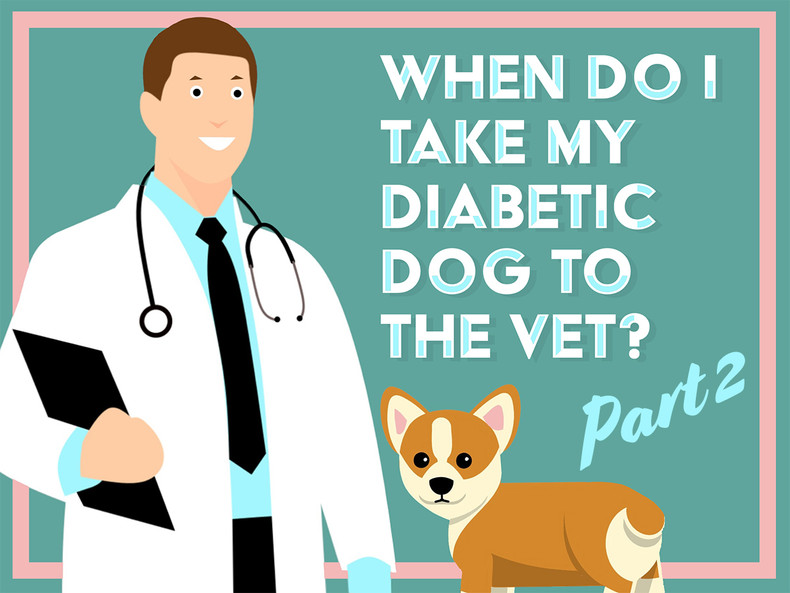When Do I Take My Diabetic Dog to the Vet Part 2
Last time we talked about Pancreatitis, this time, I’ll ask you to go back and read the blog entry on Ketones. Remember that I said that such an inexpensive, easy test can save you a lot of money and potentially save your dog’s life? This is why…
If you don’t have ketone strips in your supplies, please, please, PLEASE get some!A big part of managing Canine Diabetes is knowing what’s happening with your pup at all times until you get a real feel for his/her patterns. How do you do that? You test BG (Blood Glucose) at home AND you test for ketones at home. If you’re not testing BG (Blood Glucose) at home yet, please consider starting.Everything else hinges on it. If for some reason you can’t, then at the very least, test for ketones. It’s as easy as collecting a urine sample, dipping the strip, reading it at the correct number of seconds and knowing that your pup is safe.
Ketones can be a byproduct of high BG (Blood Glucose) numbers.If your pup is running high numbers, the best preventive test you can do is to check ketones with every pee. The vial of strips is between $7.00 - $15.00 for 50 or 100 test strips and you should always have them in your supplies. For those of you that are testing at home, any numbers over 400 you should test for ketones. If you aren’t testing BG (Blood Glucose) at home yet, I would test ketones at the first sign of increased thirst/urination. Or better yet, test each day.It may seem excessive, but ketones once present can build very quickly and I’m about to tell you why “heading them off at the pass” is well worth your time.
DKA (Diabetic Ketoacidosis):
“Diabetic ketoacidosis is a medical emergency that occurs when there is not enough insulin in the body to control blood sugar (glucose) levels. The body can’t use glucose properly without insulin, so blood glucose levels get very high, and the body creates ketone bodies as an emergency fuel source. When these are broken down, it creates byproducts that cause the body’s acid/base balance to shift, and the body becomes more acidic (acidosis), and it can’t maintain appropriate fluid balance. The electrolyte (mineral) balance becomes disrupted which can lead to abnormal heart rhythms and abnormal muscle function. If left untreated, diabetic ketoacidosis is fatal.”
And that is why testing ketones is a very good thing to do! Like most things related to Canine Diabetes, when caught early with home detection, this can be treated at home easily and DKA can be avoided. In the event that you aren’t testing ketones at home, here are some signs to look for:
- Excessive drinking
- Increased urination
- Lethargy
- Weakness
- Vomiting
- Panting
- Decreased Appetite
In the event that your pup is in DKA (Diabetic Ketoacidosis) or you suspect that he/she is heading that direction, get to the vet ASAP.The earlier it is caught and treated, the less expensive it is and the better the chances of a quick recovery.The treatment for DKA is the following:
- IV fluids to re-hydrate and replace lost electrolytes (potassium)
- Short acting insulin will be used to bring numbers down quickly while being closely monitored
There are secondary complications to DKA that will be monitored closely while your pup is in the hospital. Do not try to treat full blown DKA at home; there are too many complications that can arise.
If you are seeing trace ketones, encourage water consumption. Use a sprinkle of Parmesan cheese or a few drops from a can of tuna packed in water to entice your pup to drink and flush those ketones. You can also thaw some frozen spinach and add a bit of the drained water to the bowl, this will help replace some of the potassium that can be lost from ketones presence in the body.
As always, prevention is the key to successfully managing Canine Diabetes. With a couple easy at home tests (Blood Glucose and Ketones), you can get ahead of and stay ahead of the most debilitating things that can happen to your “Sugar Baby”.
If you have any thoughts or ideas for topics that you’d like to see covered here, please feel free to comment below or send me an email at NancyForPetTest@pharmasupply.com. As always, please “like” this blog post or any of the others that have helped you or just refreshed your memory. Look for new posts every Monday, Wednesday and Friday!
Until next time…

